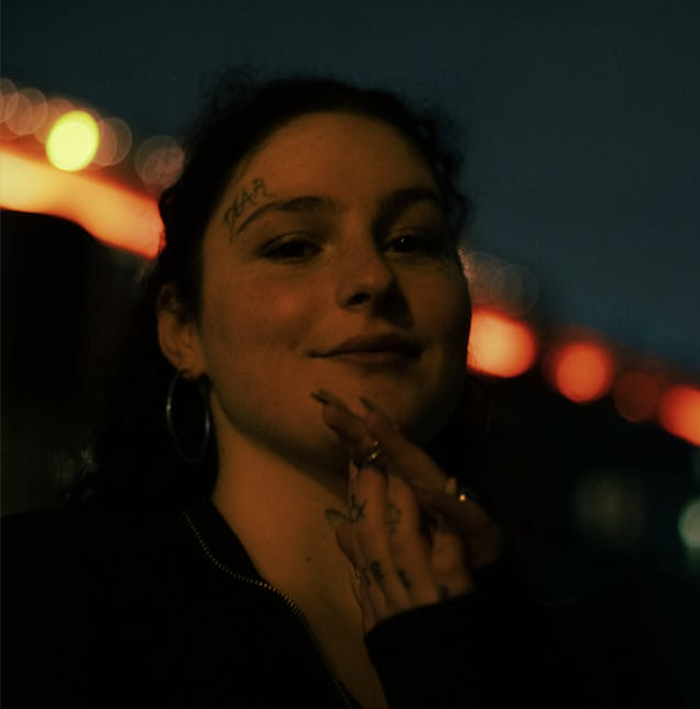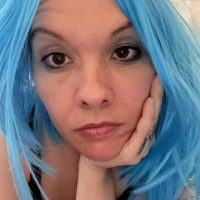I’ve been called a “warrior” many times by many people whom I deeply respect.
I wore the title like a shimmering badge of honor upon my heart although it was more than a meaningful compliment. For most of my life, it was my identity.
An identity that served me well in that it helped me to survive complex trauma, but at 42 years old I’ve long reached the point where I’m ready to finally lay my inner warrior and her high drama, seemingly constant conflict and defensiveness to rest in peace.
As in, “And it is peace I give to you and peace I leave with you—ashes to ashes, dust to dust and thank you for your service.” Peace out.
Morbid though it may sound, I’ve simply outgrown the need to be in a state of combativeness.
My two most recent pieces on Elephant have brought me face to face with the reality of war culture permeating every human experience, from aging to disability.
~
One of the most important things you can do for your vagina and your sex life—to avoid a world of problems later? Check out this device and get a free bag of craft coffee (code; EJCOFFEE)>>
~
Like buying a sea-foam green Prius and suddenly the freeway is crawling with the exact same car, now that I’m aware of it I can’t unsee it.
“F.U. Epilepsy” or one bold middle finger on a shirt with the epilepsy ribbon is the sentiment, or lack thereof, that I illustrated in my previous post. “Combat signs of aging!” The media aggressive approach to time that the media splashes all over advertisements for creams, serums, and lotions is the theme I drew attention to in the post prior to that.
I realize I might offend people who are encouraged to persevere by the David and Goliath narrative that permeates society, and that’s fine too because the problem with being offended is that you are playing offense, which puts someone else in the position of defense. It’s like an athletic sport but without the rules and regulations that distinguish friendly, safe competition from genuine barbarism.
I grew up watching Final Girls in 80s horror movies take down their antagonists against all odds, and watching a certain blonde teenager on TV “save the world…a lot.”
Female identified heroes were sparse in my childhood and adolescence, and I clung to any role model I could find to give me an example of femininity that didn’t shrivel up apologetically in the face of constant adversity in a patriarchal world.
And then I discovered music. Not me, personally—I didn’t put it on the map but I discovered music for myself by female artists who bolstered my courage and gave me a new identity in a female-driven utopia far removed from the infantilizing, mansplaining, pre-#MeToo society I grew up in during the 80s and 90s.
Like Fiona Apple, I was a “Shadow Boxer Baby.”
Like Tori Amos, I believed in “peace, B*tch!”
Like Shirley Manson, I couldn’t “use what I can’t abuse.”
Like Poe, I apparently grew up “mean” because someone messed with my dreams when I was little.
And like Gwen Stefani, I was ready to have the pink ribbon taken off my eyes.
But before all of that, there was the long overdue Riot Grrrl Movement challenging the sexist world of punk rock just south of my hometown, Seattle.
I do not for one moment regret the empowering messages my younger self internalized from my favorite female artists in all mediums. They showed a petite, young girl from a broken home that she literally had “A Fighting Chance” through what was, at the time, a revolutionary lens that has paved the way for so many women and female and femme-identified artists to come, as well as paved the way for not only content that would truly shatter the deeply embedded gender stereotypes of society but generate conversations and institute social change in life and legislation.
So what’s the problem?
There is a quote from Michelle Rosenthal, author of Your Life After Trauma:
“Survival mode is supposed to be a phase that helps save your life—it’s not meant to be how you live.”
The problem is not art and it’s definitely not social justice; the problem for me was that I continued to experience the pressure of being a badass warrior long after it had served its purpose and when it hurt me and my interpersonal relationships due to the fact that I was (and still struggle with being) combative and defensive all the time. Being in a constant state of hostility and an “us or me against them” mentality did a number on my cortisol and adrenaline levels, and ultimately my central nervous system, which meant “taking the bull by the horns” and not letting epilepsy or PTSD “mess with the wrong woman” and “teaching it a lesson” by “showing it who’s boss,” even when this was 100 percent defeating my purpose and actually making my symptoms worse. Oh my!
The mentality that had helped me survive domestic violence, sexual assault, being unhoused, being an adult child of alcoholics, generational poverty, and more was suddenly destroying me.
I was literally foiling my own best efforts, or to use a more modern analogy, “Shooting myself in the foot.”
Swords and guns were the metaphorical violent accessories I wielded skillfully throughout the three decades prior to my life-saving brain surgery. And they worked. And I was applauded.
“I will survive” (Gloria Gaynor) because “I’m a survivor” (Destiny’s Child) and “stronger” (Britney Spears) and “a fighter” (Christina Aguilera) and all of the “Slay” Queen anthems that inspired Rocky Balboa training montage vibes that motivated me to “rise up to the challenge of our rival!” (Survivor)
You’re welcome?
I was out here in a custody battle, battling addictions and other so-called “personal demons.” Pow! Mental illness, I’m going to “knock out” my to do list and “tackle” my grey hairs while “crushing” my “unforgiving” morning workout before “attacking” my thesis and “whipping” my house into shape.
Yikes.
So much hostility. And for what? Why?
I’m no longer in harms way and I’m not sure how much I was actually accomplishing besides living in a perpetual state of fight or flight mode that hurt me in the long-term more than any of my adversaries, real or imagined.
Because that’s the thing: I was mostly at war with myself.
As the song goes, “there is a time for peace and a time for war, which is actually a biblical excerpt. I am grateful to all of the social justice “warriors” out there on “the front lines” as I was once as a “trauma-informed survivor leader” but I’m no longer interested in survival of the fittest being central to my identity.
The integrity of my beliefs hasn’t changed, but my approach to them has as I continue to learn to stop beating the war drums for no one in particular, take my armor off and shift from my sympathetic fight or flight nervous system to my parasympathetic nervous system in order to heal.
“The parasympathetic nervous system, also known as “rest and digest,” can be thought of as functioning in opposition to the sympathetic nervous system.” (1)
My old MySpace tagline was: “Walk softly and carry a machine gun,” a derivation of Theodore Roosevelt’s “walk softly and carry a big stick.”
These days, I just walk softly, sans machine guns and big sticks and I don’t “pound” the pavement either.
“You’ve gone soft” was always an insult in the working class, Boomer/Gen X culture of toxic masculinity that “made me” until I took back the night, and then, as time passed, learned to just lay down and go to sleep during it.
Going soft is one of the wisest, healthiest things I have ever done for myself and my loved ones. It’s also a journey, one that requires me to lay down my machete, which is not always easy as it leaves my heart open to wounding. My body doesn’t need me to beat it into submission, which would be completely unacceptable for anyone else to do to me or anyone.
And I don’t have to w-rest-le satisfaction from life.
Approaching my sons with an aggressive, authoritarian attitude just puts them on the defensive and results in a power struggle when we are all seeking connection.
Love needn’t be “tough.”
Life needn’t be “hard.”
And crying is extremely brave, powerful, and healthy.
“Researchers have established that crying releases oxytocin and endogenous opioids, also known as endorphins. These feel-good chemicals help ease both physical and emotional pain.” ~ Leo Newhouse, LICSW
Interesting how something so beneficial still has so much stigma and shame attached to it.
Though the warrior part of me got me this far and I am both grateful and extremely proud of myself for that, I’m also ready to release what no longer serves me: my “armed guard” being one of them.
I’m learning that it takes more strength to listen to and honor my body and its needs as well as the needs of my loved ones, to open myself to love as well as rejection, to embody the courage of daily living and practice healthy habits, cultivate patience, and laugh at myself.
Brook Siem wrote: “Happiness is a most rebellious act.”
I’ve learned that acceptance doesn’t mean rolling over and allowing myself to be abused, nor does it mean wallowing in my pain or, conversely, denying my negative emotions. I’m not advocating toxic positivity or denial.
Genuine happiness, for me, means accepting that life is a spectrum and not creating false expectations of perfection, setting boundaries while opening my mind and heart, making peace with my past, and realizing that not everything deserves my time, energy, or attention or even my response because I am not responsible for saving the world. Not even a little.
Whew!
Now I’m just taking care of my little corner of it and being kind to others in my pleather pants, Dr. Martins, and a friendly wink.
I would be completely remiss if I did not quote the brilliant Jaiya John:
“The softer she became with herself, the softer she became with the world, which became softer with her. She birthed a new generational cycle: Peace.”
~
~
(1) National Library Of Medicine
Physiology, Autonomic Nervous System
Tyler LeBouef; Zachary Yaker; Lacey Whited.
Last Update: May 1, 2023.
~
Please consider Boosting our authors’ articles in their first week to help them win Elephant’s Ecosystem so they can get paid and write more.
~
Ready to join?
Hey, thanks so much for reading! Elephant offers 1 article every month for free.
If you want more, grab a subscription for unlimited reads for $5/year (normally, it's $108/year, and the discount ends soon).
And clearly you appreciate mindfulness with a sense of humor and integrity! Why not join the Elephant community, become an Elephriend?
Your investment will help Elephant Journal invest in our editors and writers who promote your values to create the change you want to see in your world!
Already have an account? Log in.
Ready to join?
Hey, thanks so much for reading! Elephant offers 1 article every month for free.
If you want more, grab a subscription for unlimited reads for $5/year (normally, it's $108/year, and the discount ends soon).
And clearly you appreciate mindfulness with a sense of humor and integrity! Why not join the Elephant community, become an Elephriend?
Your investment will help Elephant Journal invest in our editors and writers who promote your values to create the change you want to see in your world!
Already have an account? Log in.

 Share on bsky
Share on bsky







Read 8 comments and reply